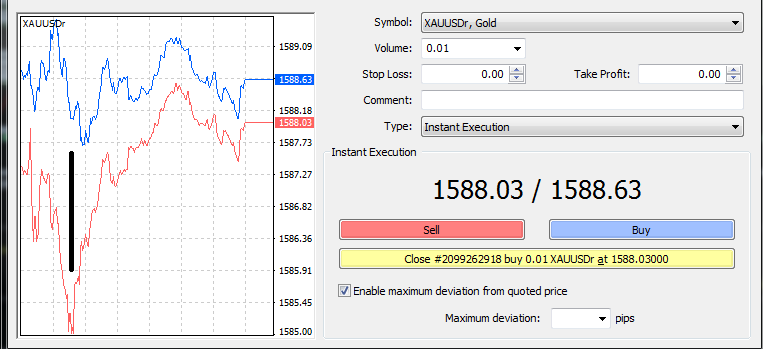关于这一点,我在之前的文字中已经有所涉及: “想赔钱,炒外汇”
现在不妨再以现货黄金的实际交易截图为例,把庄家如何偷钱的鬼把戏一一道来,让更多的人知道由华尔街操纵的金融市场到底是怎么一回事。
华尔街偷钱术的第三招是当影响市场的重大消息(比如美国就业情况报告、美联储会议决定等)出来时,为了防止散户在市场的大幅波动中赚钱,券商先是把买卖价之间的点差扩大很多(widen bid-ask spread),例如在2012年6月21日早晨8点半钟,现货黄金的买卖价点差从平常的6毛钱突然扩大到2-3块钱。
如果这招还不行的话,券商干脆关掉交易平台,拒绝接受任何买卖单。例如在2012年7月31日和8月1日,无耻券商在欧洲央行和美联储决定货币政策变化的时候,先后两次关闭交易平台,停止交易。
Widen Spread Or Shut Down System
Normally, brokerage firms set a fixed spread between their bid-ask prices. In the example chart below, the fixed spread for gold is almost always $0.60.
But when major financial news (such as Non-farm payroll numbers, Federal Reserve meeting decisions, etc.) comes out and market starts to move quickly up or down, front-end brokerages and back-end banks suddenly widen the spread between bid-ask prices, to create obstacles for buying and selling by customers with fair prices.
This screen shot was taken at 8:30 A.M. on June 21, 2012, the bid-ask spread on gold was widened from $0.60 to $2-$3 range. So if customers trade now, they would be ripped off between $1.40 to $2.40 extra per trade on each side.
Widening spread is not even the worst practice, sometimes brokerages and banks simply shut down their trading systems so no customers can buy or sell positions when market prices are moving.
Talk about "head, they win. Tail, they don't lose."
=========
欢迎访问我的博客:
依据事实数字,把握市场脉搏,运筹金融世界。

No comments:
Post a Comment